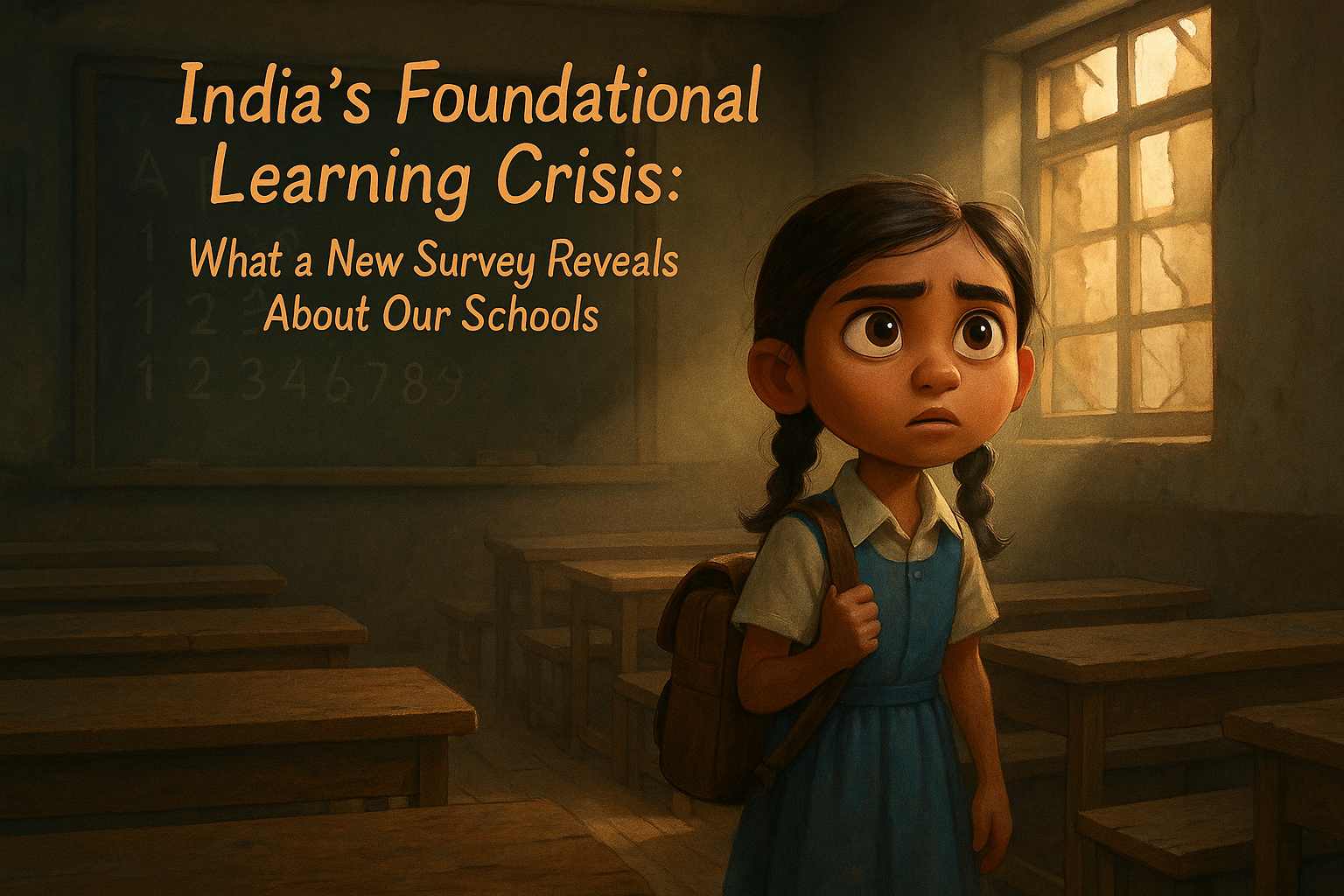Loading advertisement...
10-07-2025

Imagine a class 3 student struggling to count till 99. Or a class 6 student who cannot recall multiplication tables up to 10.
These aren’t isolated cases — they are part of a nationwide pattern highlighted in the latest report from the Ministry of Education’s Unified District Information System for Education Plus (UDISE+) and the National Achievement Survey (NAS).
Let’s look at what the data actually says — and what it means for the future of education in India.
Conducted among 21.15 lakh students from classes 3, 6, and 9 across 74,229 schools, the survey uncovered significant gaps in basic learning:
| Class | Skill Area | National Avg (%) | Kerala Avg (%) |
|---|---|---|---|
| Class 3 | Counting up to 99 | 55% | – |
| Class 6 | Multiplication tables up to 10 | 53% | – |
| Class 9 | Solving upper primary-level math problems | 28% | 32% |
| Class 9 | Reading and comprehension | 46% | 64% |
✅ In class 3:
Only 55% of students can correctly count up to 99.
This means nearly half of our youngest learners cannot confidently perform what should be a foundational skill.

✅ In class 6:
Only 53% of students know multiplication tables up to 10.
Mastery of tables is crucial for higher-level math, and lack of it makes subjects like fractions, algebra, and word problems extremely difficult.
✅ In class 9:
Only 28% of students nationwide can solve upper primary-level math problems.
In Kerala, this figure is slightly better at 32%, but still deeply concerning.
✅ Reading and comprehension in class 9:
Nationwide, just 46% of students can read and understand text appropriate for their grade.
Kerala fares better at 64%, yet even this leaves over a third of students struggling.
These numbers don’t just reflect test scores — they reveal something much deeper:
Students are progressing through grades without truly understanding what they learn.
Gaps in basic skills like counting, multiplication, and reading accumulate over the years, making it almost impossible to catch up by higher classes.
By class 9, the curriculum becomes more abstract and complex — but many students haven’t built the foundation needed to handle it.

This leads to:
While each region, school, and student has a unique context, the survey reflects some broader systemic issues:
🧩 Overemphasis on rote learning:
Children often memorize answers rather than understand concepts, leading to weak foundational skills.
🏫 Lack of remedial teaching:
Students who fall behind in early classes rarely get targeted help to catch up.
📋 Exam-driven classrooms:
The rush to complete syllabus leaves little room for activity-based learning, revision, or practice of basics.
💡 Teacher workload and resources:
Many teachers handle large classes with limited time and training in differentiated instruction.
🌐 Social factors:
Distractions from social media, tuition pressures, family expectations, and language barriers add to the challenge.
This crisis is not new — but the survey gives policymakers, educators, and parents fresh data to act on. Here’s how we can move forward:
✅ Strengthen foundational literacy and numeracy (FLN):
Focus on ensuring every child can read, write, and do basic math before moving to complex topics.
✅ Early identification of learning gaps:
Use simple assessments to regularly check students’ understanding and offer support immediately.
✅ Bridge courses and remedial classes:
Especially for students in classes 6–9 who missed foundational learning due to COVID-19 disruptions.
✅ Make learning joyful and practical:
Use games, real-life examples, and interactive tools to teach counting, tables, and comprehension.
✅ Invest in teacher training:
Equip teachers to identify gaps, teach mixed-ability classrooms, and move beyond rote methods.
✅ Engage parents and communities:
Help them understand the importance of foundational skills rather than just marks.
These findings are more than statistics — they’re a reminder that education is not just about moving to the next class, but about what children really learn and remember.
Without mastering the basics, students can’t unlock the doors that education promises: confidence, opportunity, and empowerment.
It’s time to refocus on what truly matters:
✅ Every child, in every class, must first learn to count, read, and think — before we ask them to remember dates, definitions, or formulas.
✅ Stay connected with Skool Guru for more educational tips, exam strategies, and academic guidance.
📞 Need help? Contact our mentors today!
Visit: www.skoolguru.in